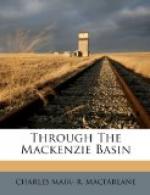The other members of the party had at various times and places separated, some going here and some there; but all eventually left the country, and the company died a natural death. But Mr. McLean is not only a firm believer in the mineral wealth of the North, but in its resources otherwise. There are extensive areas of large timber, and the lakes swarm with fish. The soil on the Liard River is excellent, and he tells me that not only wheat but Indian corn will ripen there, as he himself grew both successfully when in charge of that district.
The mining enterprises referred to fell through, but I have described them at some length since they are very interesting as being the first attempts at prospecting with a view to development in those remote regions. Failure, of course, at such a distance from transport and supplies, was inevitable. But some of the prospectors, Captain Hall and others who came out with ourselves, seemed to have no doubt that much of the country they explored is rich in minerals. Indeed, should the ancient repute of the Coppermine River be justified by exploration, perhaps the most extensive lodes on the continent will yet be discovered there.
If the Hudson’s Bay route were developed, a short line of rail from the western end of Chesterfield Inlet would tap the mining regions prospected, and develop many great resources at present dormant. The very moss of the Barren Lands may yet prove to be of value, and be shipped to England as a fertilizer. I have been told by a gentleman who has travelled in Alaska that an enterprising American there is preparing to collect and ship moss to Oregon, where it will be fermented and used as a fertilizer in the dairy industry.
To return to Lake Athabasca. It seemed at one time to have been the rallying-place of the great Tine or Dene race, to which, with the exception of the Crees, the Loucheaux, perhaps, and the Esquimaux, all the Indians of the entire country belong. It is said to have been a traditional and central point, such as Onondaga Lake was to the Iroquois.
It is noticeable that, in the nomenclature of the various Indians of the continent, the names by which they were known amongst themselves generally meant men, “original men,” or people; e.g., the Lenni Lenape of the Delawares, with its equivalent, the Anishinape of the Saulteaux, and the Naheowuk of the Crees. It is also the meaning of the word Dene, the generic name of a race as widely sundered, if not as widely spread, as the Algonquin itself.
The Chipewyan of Lake Athabasca speaks the same tongue as the Apache of Arizona, the Navajo of Sonora, the Hoopa of Oregon, and the Sarcee of Alberta. The word Apache has the same root-meaning as the word Dene though that fierce race was also called locally the Shisindins, namely, “The Forest People,” doubtless from its original habitat in this region.




